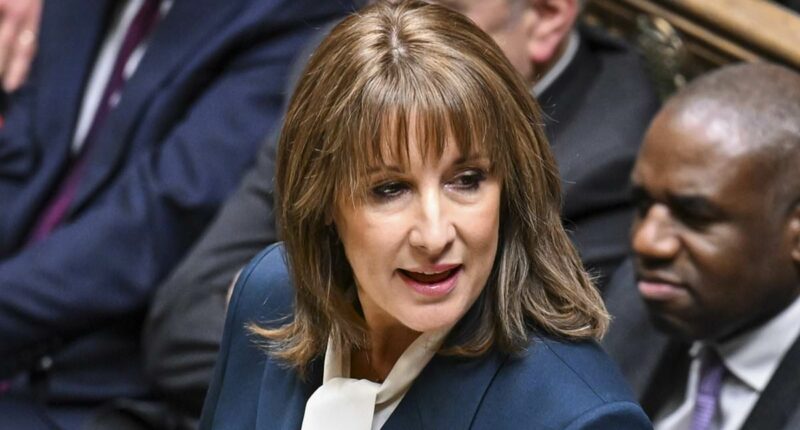Share this @internewscast.com
The timing of America’s Thanksgiving holiday season has inadvertently played to the Chancellor’s advantage, whether by chance or strategic foresight.
During this period, nearly half of the UK government bonds are held by global investors and traders. It’s a serendipitous moment, as the big players in US macro-hedge funds, who focus on economic and fiscal dynamics, are more preoccupied with their Thanksgiving festivities than with developments in north-west Europe.
The Chancellor’s efforts to restore a more acceptable fiscal environment, with a £22 billion fiscal headroom, should offer some reassurance to the debt markets. However, the longevity of this calm remains uncertain.
Assistance also comes from across the Atlantic, where US Treasury yields are on a downward trajectory. This decline reflects expectations of a reduction in official US interest rates in the coming month.
Rachel Reeves has highlighted the frequent correlation between US bond market movements and those in Britain, suggesting that these international trends could have a positive influence on the UK.
Nevertheless, the UK’s debt management office is facing a substantial challenge, as it must meet a gross financing requirement of £329 billion by the fiscal year 2025-26.

Pensions grab: By savaging retirement saving Chancellor Rachel Reeves will reduce funds to be devoted to equities and alternative assets such as start-ups
It won’t take much of a change in geopolitics, Trump tariffs or events closer to home to endanger bond market stability. Reeves talked up growth, entrepreneurship and innovation – all terribly worthy.
As an economist, she has forgotten a basic construct: savings equal investment. The Budget puts the boot into savings.
One tiny concession is the exclusion of retail buying of initial public offerings from stamp duty.
Working in the other direction is her clampdown on salary sacrifice saving for pensions, raising a hefty £4.7billion.
The Treasury has a visceral aversion to tax reliefs cascading down the generations, from relief on mortgage interest rates to insurance premiums.
A lesson from the past is that removing tax incentives from pensions, as Gordon Brown did in 1997, can have disastrous effects.
By savaging retirement saving Reeves will reduce funds to be devoted to equities and assets such as start-ups.
Illustrating how the words never match actions, the tax incentive to invest in venture capital has been sliced from 30 per cent to 20 per cent. That will be unhelpful to Britain’s ambition to become a tech powerhouse which can take on Silicon Valley.
That would be a shameful outcome.
Waving goodbye
No one should be shedding tears over the departure of Advent dealmaker James Brocklebank from these shores.
The private equity kingpin largely was responsible for the demolition of aerospace innovator Cobham in a record-setting time.
The exit of the super-rich from these shores, whether it be steel magnate Lakshmi Mittal or Brocklebank, is regrettable. It speaks to Labour’s contempt for entrepreneurship.
I have little sympathy for multi-millionaires and billionaires who seek to avoid taxation when PAYE employees and small businesses find it harder to escape.
More worrying is the leakage of talent.
A tech business creator of my acquaintance says that since Rachel Reeves’ first Budget, his most skilled digital and cyber experts have been besieging his office demanding redeployment in the US or Dubai.
They are part of the brain drain of medics, scientists, technology and AI pioneers leaving in the tens of thousands.
Recent data shows that 257,000 people left Britain in the year ending December 2024. Among those going are the citizens and guest entrepreneurs most capable of driving output.
Rachel Reeves’ latest layers of taxation, from ‘mansions’ to the extended freeze on thresholds, does nothing to instil confidence in enterprise.
As for Brocklebank’s escape to Luxembourg – good riddance!
Past practice
As a financial journalist covering Budgets for more than five decades it would be cold-hearted not to feel sympathy for the Chancellor as she delivered her carefully prepared speech.
Her words were largely lost on the City, media and political classes deeply engrossed in the Office for Budget Responsibility’s dismal economic and fiscal projections.
Accidental release provided a reminder of the resignation of Hugh Dalton in 1947 when a careless comment on tax to the Evening Standard triggered the Chancellor’s immediate exit. Times change…
DIY INVESTING PLATFORMS
AJ Bell

AJ Bell
Easy investing and ready-made portfolios
Hargreaves Lansdown

Hargreaves Lansdown
Free fund dealing and investment ideas
interactive investor

interactive investor
Flat-fee investing from £4.99 per month
Freetrade

Freetrade
Investing Isa now free on basic plan
Trading 212
Trading 212
Free share dealing and no account fee
Affiliate links: If you take out a product This is Money may earn a commission. These deals are chosen by our editorial team, as we think they are worth highlighting. This does not affect our editorial independence.
Compare the best investing account for you










